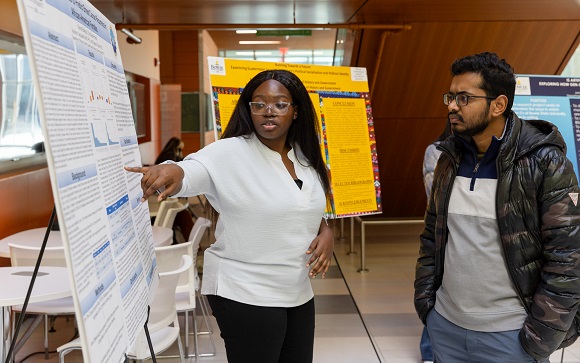Written By Bowie State University
No prior research experience? No problem. At least, that is the idea behind the 2023 Semester-based Undergraduate Research Institute (SURI) Symposium held on Dec. 8 to highlight projects that expose Bowie State University students, no matter their background, to the practice of research.
The program, which started in 2015 as a nine-week summer opportunity, connects students with little-to-no research experience with faculty mentors who guide them through projects designed to pull the veil back on what it means to be a researcher.
“Dr. Guy-Alain Amousou has always had a vision for every student in every discipline to participate in research,” said Julian Ajenifuja, the SURI program coordinator. “No matter what discipline, you have to research. We have students in the fine arts, nursing and social sciences participating in research. We want student to be experts in their area of discipline.”
In 2019, the focus shifted from conducting summer research to executing projects during the fall, which would include two different forums and a symposium at the end of the semester where the research teams can display and present their project findings.
Professors work with up to three students on projects that range from studying the cultivation of industrial hemp to how to implement machine learning to enhance protections for IoT systems. Most students produce a labored sigh when confronted with the prospect of research, but the SURI program has a way of showing them that conducting research isn’t such a Herculean feat.
“People typically see research as you sitting in a lab playing around with cells,” said Destiny Allen, a senior child and adolescent studies major. “But it can be as little as asking a few questions around campus or diving deeper into a topic you like to talk about.”
Senior computer technology major Muhammad Bangura was initially hesitant to answer the call when one of his professors encouraged him to look into the SURI program. However, he wound up enjoying the process of developing codes, algorithms and datasets for the project and saw how his experience translates beyond campus.
“At first, I was kind of hesitant because I didn’t know exactly what it entailed,” said Bangura. “I said let me take a chance. I learned a lot I didn’t know before, and it was challenging. It gets you mentally prepared for the real world. Presenting information in front of people gets you to a next level.”
The posters lined around the lobby off the Natural Sciences Building are a symbol of the untapped learning potential students can experience once they reconcile their understanding of what it means to do research. As the SURI grows, Ajenifuja hopes the program can break new ground and continue to broaden students’ understanding of what it means to be a researcher.
“We want to start getting into interdisciplinary studies,” she said. “Maybe someone from natural sciences teaming up with somebody from fine arts, and they’re working on a research project together. We want students to understand research is for everybody, not just for those in STEM.”

